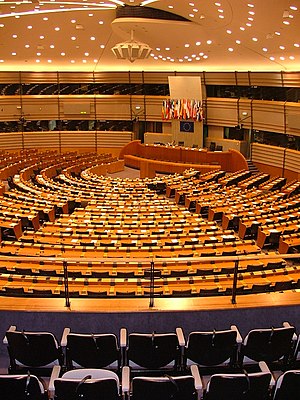
Zelevova's troubles started with her 'grilling' by EU parliamentarians a few days ago. As per norm, the EU parliament gets a shot to ask any and all questions to would-be commissars. And with the 40-year-old Jeleva, they were feeling extra ornery.
Here's some key background on Jeleva from Wikipedia.
But those in the know had been whispering that Jeleva was EU Commission President Manual Barroso's 'weakest link.'
The EU lawmakers, namely from the left, a hodgepodge of socialists, greens and other sundry liberals, barraged Jeleva with questions on her income, her firm, Global Consultancy, and the murky ties her husband's firm has to alleged Russian underworld figures.
Here's how the top notch Corporate Europe Observatory team reported on events.
During her hearing in Parliament on Tuesday 12 January, designate Commissioner Rumiana Jeleva came under fire over potential conflicts of interest resulting from undeclared business interests. She was also accused of irregularities in the declarations of financial interests that she filed as a member of the European Parliament (2007-2009). After the hearing there was a lot of doubt about her ability to handle the portfolio she has been assigned. At the time of writing, Ms. Jeleva’s chances of becoming European Commissioner for International Cooperation, Humanitarian Aid and Crisis Response look very slim indeed.
Zeleva is just one cornflake in Bulgaria's breakfast bowl of graft, however.
As the New York Times has reported, Bulgaria is winner by a mile in the EU race of the most corrupt.
European Union membership has done little to tame the criminal networks in Bulgaria. It has arguably only made those networks richer, raising worries that if the union cannot tamp down criminal activity in a member like Bulgaria it may have little sway over other fragile nations that want to join.
Frustrated and furious that EU money has disappeared down the black hole that is Bulgaria, Brussels froze nearly $670 million in aid in 2008.
The New York Times piece explains well how things work in Bulgaria:
The nation’s homegrown mobs of men in black — the “mutri,” or mugs — control construction projects in city halls. And questionable business networks have moved from declining black markets for smuggled cigarettes and alcohol to legal investments in booming real estate. They have made their mark on the capital’s atmosphere: men nicknamed “thick necks” for their muscular appearance linger in neon-lighted nightclubs like Sin City and Lipstick, or keep watch over Mercedes jeeps and Audis outside. Sofia guidebooks offer tips: Avoid restaurants that draw businessmen with four or more bodyguards.
Bulgarians don't have Superman to clean up the mess, they have someone better: Bojko Borisov. He, himself, is a former fitness fanatic rapped in muscles who served as a 'bodyguard' under the old communist regime. But instead of turning to crime (at least that's the way he tells it) like his erstwhile lifting pals, he turned crusader, vowing to clean out the corruption from Bulgaria. The Balkans own bastardized version of Arnold Schwarzenegger, if you will.
But in the case of Zelava, Borisov came to here aid, defending her from the verbal onslaught from the geeky EU lawmakers.
Zelava, however, has tossed in the towel, and gave up her candidacy for the EU post. She also stepped down from the Bulgarian government.
In her place, Sofia has picked World Bank Vice-President Kristalina Georgijeva, for the EU humanitarian aid post.
Whether her reputation is as pure as her name is still to be seen. She goes in front of the EU inquisition in February.
But in the case of Zelava, Borisov came to here aid, defending her from the verbal onslaught from the geeky EU lawmakers.
Zelava, however, has tossed in the towel, and gave up her candidacy for the EU post. She also stepped down from the Bulgarian government.
In her place, Sofia has picked World Bank Vice-President Kristalina Georgijeva, for the EU humanitarian aid post.
Whether her reputation is as pure as her name is still to be seen. She goes in front of the EU inquisition in February.
![Reblog this post [with Zemanta]](http://img.zemanta.com/reblog_e.png?x-id=a95192b0-b13b-4891-ab82-ff25954f8c12)
No comments:
Post a Comment